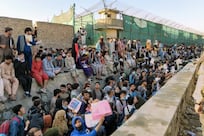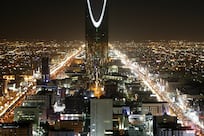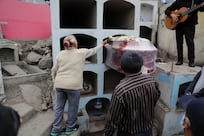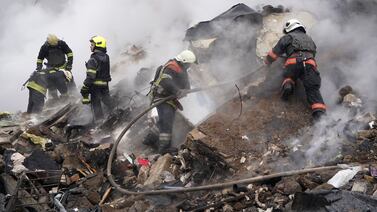Lebanese banks will close for three days starting Monday as security concerns mount after waves of angry depositors stormed banks across the country demanding their savings.
The Association of Banks in Lebanon announced the closures.
Caretaker Interior Minister Bassam Mawlawi has called for an emergency meeting of security forces to discuss measures that could be taken, the National News Agency reported.
“After taking into consideration the risks, the board of directors has taken a decision to close the banks,” the banks' association said in a statement.
It denounced the incidents, saying it rejects violence and called on the government to pass laws to address the economic crisis as quickly as possible.
The board will meet early next week to decide on the next steps.
On Friday, there was a steady stream of banks being broken into and raided by depositors with at least four separate incidents reported.
It follows two such raids by depositors on Wednesday, who were demanding access to savings frozen by lenders that have imposed strict withdrawal limits ― citing the financial crisis.
On Friday, a man with a toy gun was arrested after storming a branch of Byblos Bank in the southern city of Ghazieh to demand his savings, while another entered a branch of Blom Bank in Beirut’s Tariq Al Jdideh district.
A third man armed with a pellet gun entered a branch of LGB Bank in Beirut's Ramlet Al Baida area of Beirut requesting to withdraw his $50,000 in savings.
Another reportedly tried to forcibly withdraw his savings from Fransabank in Baaqrif.
Outside the Blom Bank in Tariq Al Jdideh people gathered in support of Abed Soubra as he demanded his savings of $125,000. Witnesses also reported that an older lady was inside insisting on withdrawing her $1,200. Police and the army were on the scene.
Mr Soubra was passing messages out of the bank to the waiting crowd via an accomplice, Fadi, who stood on top of the ATM.
He leaned down and spoke to Fadi who turned to the crowd gathered outside and shouted, “he says they offered to give him $40,000 at the rate of 12,000 [Lebanese pounds to the dollar].”
The crowd laughed and there were cries of “no way”.
Officially the Lebanese pound is pegged at 1,507 to the dollar but is now trading at 38,000 on the parallel market.
“He's a merchant and he's in the right and he could go to jail because people need money from him. What should he do? Go to jail because people need money from him while he has money in the bank?” local resident Rabih Kojok told Reuters from outside the bank.
A man who identified himself as an uncle to one of the bank staff taken hostage said he was concerned about his niece as she was being held but wasn't responsible.
“She's just an employee and she can't do anything. But at the same time I understand and I empathise with them, my own money is trapped in the bank,” Issam Mahdi told The National.
"I wish I could do something like this but because of my reputation — I'm a retired officer — I can't.”
Hardline customer rights group Depositor's Outcry assisted in at least one raid on Wednesday, demonstrating alongside Sally Hafez as she demanded her savings to pay for her sister’s cancer treatment.
But, the group gave a warning that more would follow.
Lebanon's banking association urged authorities on Thursday to hold accountable those engaging in “verbal and physical attacks” on banks and said lenders themselves would not be lenient.
The wave of raids comes a month after Bassam Al Sheikh Hussein took hostages at the Federal Bank of Lebanon and demanded $35,000 of his savings after accruing debts paying for his father’s medical treatment.
The public rallied behind Mr Hussein and staged demonstrations in support of his actions.
Depositors have been locked out of much of their savings as banks have frozen accounts and put limits on withdrawals since the country spiralled into economic collapse in 2019.
The capital controls were never formalised by law but courts have been slow to rule on depositors' attempts to obtain savings via litigation against banks, leading some to seek alternative ways of withdrawing their money.
Banks have closed branches rather than comply with court orders to release funds to depositors and to protest judicial orders.



















